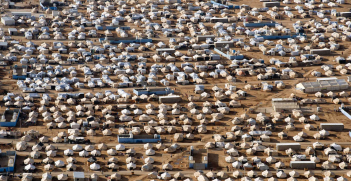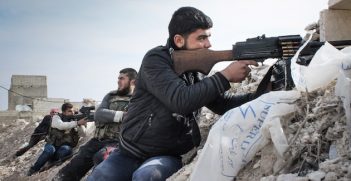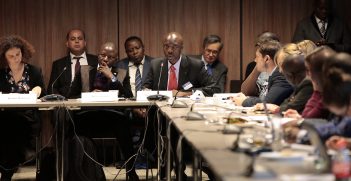Keeping a Watch on Human Rights in New Syria

Syria’s post-conflict recovery is at risk without its new regime re-establishing human rights and applying them.
The United Nations is active in Syria. However, it remains focussed on delivering accountability to former Assad regime personnel who violated human rights, ignored International Humanitarian Law, and carried out large scale dispossession of property held by civilians in areas raged over by civil war. It needs to also focus overwatch on the former al-Qaida affiliates and the new government of Syria, Haya’t Tahrir al Sham (HTS) led by Abu Mohammed al-Jawlani now using the name Ahmed al-Sharaa.
On 6 February 2025, the Independent International Commission of Inquiry on the Syrian Arab Republic issued a report which also included reference to a range of crimes committed by HTS. Syria’s responsibilities associated with international instruments to protect its citizens’ rights, such as International Covenant on Civil and Political Rights (ICCPR) ratified 1969, Convention Against Torture and Other Cruel, Inhuman, or Degrading Treatment or Punishment (CAT) 2004, and the Convention on the Elimination of All Forms of Discrimination Against Women (CEDAW) 2003, were never satisfactorily implemented.
These responsibilities remain for the new Syrian HTS leadership to deal with. How it does so will indicate the complexion of the new regime.
Human rights hold varying levels of authority in national governance across the globe. However, many currently see rights as on the decline. The expansion and diversity of rights discussions has probably left behind the prospect of many countries emerging from conflict to treat them all. Nonetheless, there are basic rights plus those like property rights and independent courts which combine to provide stability. These should be pressed into Syria as they tend to remove oxygen from warlordism.
Syria’s HTS rulers have the task of post-conflict stabilisation ahead, but no shortage of foreign help. Right now, local realities dominate, and how they are dealt with will reveal the nature of the new regime which expects to be in power until elections may be held in five years’ time.
In its 2025 observations on Syria, Human Rights Watch reported that in February 2025, triggered by local reports of torture by HTS, large protests erupted in the Idlib region demanding the release of detainees, governance and socioeconomic reforms, and the removal of HTS leader Abu Mohammad al-Joulani (now better known after the fall of the Bashar al-Assad regime on 8 December 2024 as Ahmed al-Sharaa). Idlib and its four million people was the test bed for what is now evolving in Damascus.
The UN Syria Commission of Inquiry’s (COI) earlier 10 September 2024 report documented the unlawful deprivation of liberty, torture and ill-treatment, executions, and death in detention by HTS. “We documented torture and executions of detainees held by Hayat Tahrir al Sham (HTS) in the northwest. They and some SNA (the Turkish-backed and HTS aligned Syrian National Army) factions in the north are using several of the same brutal torture methods in their detention facilities as the Government…” COI Commissioner Lynn Welchman said. The report also said, “The northwest saw unprecedented large demonstrations calling for the overthrow of HTS leader Al-Joulani, release of detainees and reforms”.
Ahmed al-Sharaa will need to shake this reputation if his needs for help and security are to be met by rights-focussed western governments and their constituencies. The western elements of the international community are already pressing for progress.
One source of practical thinking is the Syrian Network for Human Rights (SNHR). It has turned human rights violations into workable suggestions for improvement by the al-Sharaa HTS government. Its 4 February report into human rights violations during January 2025 after the December HTS takeover of Syria says there were 129 arbitrary detentions by HTS that month across a number of provinces. 100 other arbitrary detentions were at the hands of Turkish-backed Syrian National Army and the Kurdish/US supported Syrian Defence Force as they tussled over contested territory and detained opponents and critics. Expect more car bombings and violence in coming weeks as the HTS’s Central Security Department seeks to reduce territory held by Syrian Kurds. HTS has said it will not tolerate the division of Syria such as sought by some Kurdish militants. Türkiye will likely offer help to Damascus to pressure Syrian Kurds.
According to its report, SNHR “stresses the urgent need to establish legal regulations that will put an end to the harrowing era of arbitrary arrests and enforced disappearances, and ensure respect for the basic human rights of individuals, in the wake of the major political and military changes brought about by the fall of the Assad regime on December 8, 2024, with the regime having been succeeded by a transitional government.”
The HTS Syrian interim government now controls an ethic and religious mix usually seen as positive by countries like Australia, which promote and protect social diversity and human rights.
Australia, out of concern for the welfare of Syrian Christians during a civil war—which on the Islamist side had pogrom-like and genocidal features, increased its refugee intake in 2015 by adding, as a one-off response, approximately 12,000 Syrian Christians, Yazidis, and other non-Muslim minorities as well as some Muslim families in crisis. Protection of minorities and their rights needs to be a continuing feature of Canberra’s engagement with the United Nations and with like-minded donors to Syrian recovery.
Australia can influence Syria and other states by seeking that HTS has detention systems open to independent monitoring of the prohibition of torture; ensuring the legal and organised release of detainees and cessation of arbitrary deprivation of liberty; ending forced disappearances and denial of access to records for families of the disappeared; creation of some certainty of transitional justice to victims of human rights violations as part of Syria’s mooted National Dialogue Process; working with international and local partners to suppress human rights violations by armed groups in Syria and collection of data for legal processes of accountability. Finally, the al-Sharaa interim government needs to ensure that fair trial procedures exist and violations of the International Covenant on Civil and Political Rights cease.
These points may seem onerous given the HTS needs to deal with egregious offences against human rights by all parties to the Syrian civil war as well as start the experience of national governance. It may not yet have the capability or command and control to constrain local transgressions. Public monitoring of its application of effort, along with diplomatic engagement linked to aid and recovery should be the major lines of international activity in coming months.
Philip Eliason, former Australian diplomat and independent international security consultant was also Senior Adviser Middle East to Australian former Foreign Minister Hon. Julie Bishop.
This article is published under a Creative Commons License and may be republished with attribution.





